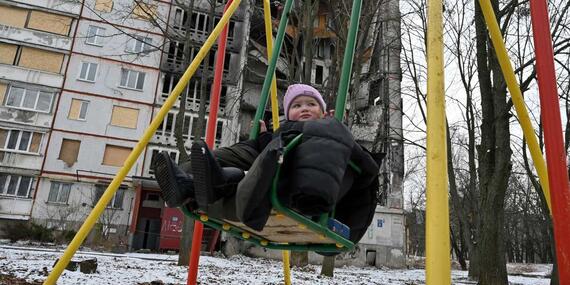Today's top news: Ukraine, Occupied Palestinian Territory, Sudan, Syria, Somalia

Ukraine
We are concerned about civilian casualties and damage to homes following recent attacks in the country.
On Monday, at least three civilians were killed and seven more injured, including a child, when a residential building was hit in Sumy, in the northeast of the country, according to the UN Human Rights Monitoring Mission to Ukraine.
Yesterday, dozens of civilians, including children, were reportedly injured when several multi-story buildings were damaged in the town of Pervomaiskyi in the eastern Kharkiv region. While verification continues, humanitarian partners are providing psychological assistance and emergency shelter materials for at least 180 families whose apartments were damaged.
We have also received reports of civilian casualties and healthcare facilities affected by hostilities from areas of Donetska oblast under Russian control.
International humanitarian law is clear: care shall be taken by all parties to protect civilians and civilian infrastructure.
We continue to support affected communities across the country. Today, an inter-agency convoy delivered vital food, medical supplies, hygiene and household items to support 1,300 residents of Siversk town in Donetska oblast, 10 km from the front line. Humanitarian assistance is a lifeline in this town, which has been shelled continuously. Most of the remaining inhabitants are the elderly, many of whom live in damaged houses without tap water, gas or electricity.
We also continue to support the response to the Kakhovka Dam destruction. Yesterday, the 14th inter-agency convoy to the Kherson region brought bottled water, medicines, hygiene kits and disinfectants to nearly 500 people in settlements affected by the flooding and previous months of fighting.
Occupied Palestinian Territory
OCHA staff along with partners are now in Jenin, to assess humanitarian needs in the refugee camp following the end of the Israeli operation there.
The repair of water and electricity network and provision of shelter for those who have lost their homes will be among the top priorities in the coming days.
According to local authorities, twelve Palestinians, including four children, and one Israeli soldier were killed during the operations. At least 143 people were injured.
Sudan
In a statement today, top UN officials, voiced shock and condemnation at increasing reports of gender-based violence in the country since fighting erupted there more than 11 weeks ago.
The heads of OCHA, the UN Human Rights Office, the UN Refugee Agency, UNICEF, UN Population Fund, UN Women and the World Health Organization called for an immediate end to gender-based violence, including sexual violence as a tactic of war to terrorize people.
They also stressed the need to swiftly scale up gender-based violence prevention and response services in Sudan, as well as in neighbouring countries, where those fleeing violence have sought safety as refugees, to meet the soaring needs.
Under-Secretary-General for Humanitarian Affairs Martin Griffiths said it is unconscionable that Sudan’s women and children are being further traumatized amid this senseless conflict.
Syria
In a statement issued a short time ago, UN humanitarian leaders called for the renewal of authorization for cross-border aid deliveries to northwest Syria, describing it as a lifeline for millions of people, most of them women and children.
The heads of the UN Office for the Coordination of Humanitarian Affairs, UNICEF, the UN Refugee Agency, the International Organization for Migration, the World Food Programme, the World Health Organization, and the UN Population Fund said the Security Council must renew Resolution 2672 for at least 12 months so that humanitarian organizations can continue to reach people in need effectively and without delay.
Any and all avenues to deliver humanitarian assistance must be kept open and, indeed, expanded.
The full statement is available here.
Somalia
Efforts to mitigate the ongoing impact of drought and food insecurity in Somalia are ongoing.
The Somalia Humanitarian Fund has put US$25 million toward helping communities reeling from the effects of drought. Meanwhile, $18 million from the Central Emergency Response Fund has been allocated for famine prevention efforts.
Although famine has been averted, with improvements in the food security situation and recent rains bringing some relief – needs remain high: More than 8 million people still need humanitarian assistance and protection, and recovery from a drought of this magnitude will take years.
